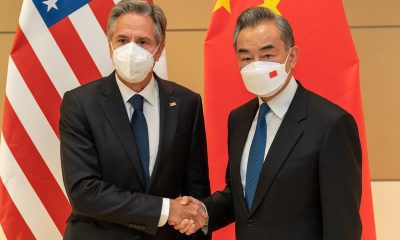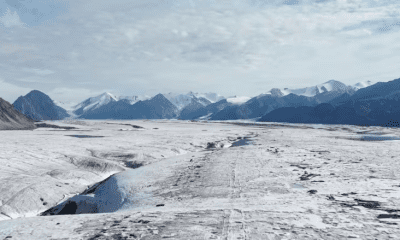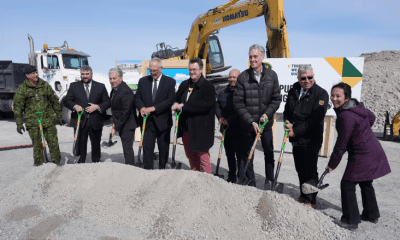World News
Cellphone operator reveals scale of gov’t snooping
LONDON (AP) — Government snooping into phone networks is extensive worldwide, one of the world’s largest cellphone companies revealed Friday, saying that several countries demand direct access to its networks without warrant or prior notice.
The detailed report from Vodafone, which covers the 29 countries in which it operates in Europe, Africa and Asia, provides the most comprehensive look to date at how governments monitor mobile phone communications. It amounts to a call for a debate on the issue as businesses increasingly worry about being seen as worthy of trust.
Wiretapping of phones and accessing of call records for law-enforcement purposes is a decades-old and accepted practice even in the most open democracies. With backing from courts, police can request cooperation from phone companies, a valuable tool for the pursuit of criminals.
But the most explosive revelation in Vodafone’s report is that in six countries, authorities require direct access to an operator’s network – bypassing legal niceties like warrants and eliminating the need to get case-by-case cooperation from phone-company employees. It did not name the countries for legal reasons and to safeguard employees working there.
“In those countries, Vodafone will not receive any form of demand for lawful interception access as the relevant agencies and authorities already have permanent access to customer communications via their own direct link,” the report said.
Vodafone would not say which countries have established these direct links. But in an exhaustively researched appendix to the report, the U.K.-based company sheds light on the legal frameworks that surround government interception in the 29 countries. The appendix reveals that six countries – Albania, Egypt, Hungary, Ireland, Qatar and Turkey – have provisions that allow authorities to request unfettered access.
In two other countries, India and the U.K., legal provisions are unclear as to whether government officials are allowed to have direct access, according to the report.
Vodafone’s report comes one year after former NSA systems analyst Edward Snowden revealed that the U.S. and other countries’ intelligence agencies routinely and indiscriminately gather and store huge amounts of data from phone calls and Internet communications.
The revelations have focused particular attention on the role of Western technology and telecommunications firms, which stand accused of facilitating the mass surveillance by giving spies unrestricted access to their networks. Several Silicon Valley companies have since attempted to restore consumers’ trust by publishing data on government surveillance.
But telecoms companies found themselves in an even more uncomfortable position. Historically closer to governments since many were once state-owned, telecoms companies are much more heavily regulated and have employees on the ground – making them more sensitive to government demands for data.
By making its report public, together with a breakdown on requests for information, Vodafone took the unusual step of entering the international debate about balancing the rights of privacy against security. Rather than being stuck with responsibility and consumer backlash when consumers realize their data has been scooped up without their knowledge, companies like Vodafone have decided it is time to push for a debate.
“Companies are recognizing they have a responsibility to disclose government access,” Daniel Castro, senior analyst for the Information Technology and Innovation Foundation in Washington, D.C. “This is new.”
The study comes at a time when other businesses are also calling for a revamp of laws too outdated to stand up to the quickly changing telecommunications universe.
Executives in Silicon Valley, for example, have stepped up pressure on President Barack Obama to curb the U.S. government surveillance programs that collect information off the Internet.
Twitter Inc., LinkedIn Corp., AOL Inc., Google Inc., Apple Inc., Yahoo Inc., Facebook Inc. and Microsoft Corp. are pushing for tighter controls over electronic espionage – fearing that eavesdropping threatens the technology industry’s financial livelihood.
“They want their customers to be able to trust them to store their data in a private and secure manner,” Castro said.
Vodafone’s report is also seen by some as an effort to turn the page on the company’s embarrassing role in the protests that toppled Egyptian strongman Hosni Mubarak in 2011. As the protests raged, Vodafone bombarded its Egyptian subscribers with pro-government text messages. At the time, the company said it had no choice but to comply, but was severely criticized for its actions. A change in culture followed.
“They took a hard lesson there,” said Cynthia Wong, a senior internet researcher at Human Rights Watch. “Even if the government is the ultimate problem, they realized they needed to take steps to mitigate harm to their users.”
Civil liberties advocates applauded Vodafone for releasing the report, and cracking open the debate, even as they expressed alarm at the infringements into civil liberties.
“For governments to access phone calls at the flick of a switch is unprecedented and terrifying,” said Shami Chakrabarti, director of the human rights group Liberty, adding that the Snowden revelations showed the Internet was already being treated as “fair game.”
“Bluster that all is well is wearing pretty thin – our analogue laws need a digital overhaul,” she said.
Though some of the governments included in the report were able to block disclosure of any aspect of how interception was conducted, the report is unique in that it offers insight into how governments conduct surveillance.
Though some of the U.S. operators, such as AT&T and Verizon offered information amid the Snowden allegations, the level of detail is minuscule compared with Friday’s report, Wong said.
Civil liberties advocates weren’t the only ones applauding Vodafone’s actions. Norway’s Telenor Group, which also has operations across Eastern Europe and Asia, offered support, noting governments have the ultimate responsibility to act.
The countries included in the report are: Albania, Australia, Belgium, the Czech Republic, Congo, Egypt, Fiji, France, Germany, Ghana, Greece, Hungary, India, Ireland, Italy, Kenya, Lesotho, Malta, Mozambique, the Netherlands, New Zealand, Portugal, Qatar, Romania, South Africa, Spain, Tanzania, Turkey and the U.K.
—
Associated Press Writers Raphael Satter in London, Jan M. Olsen in Copenhagen and Peter Svensson in New York contributed to this report.






















